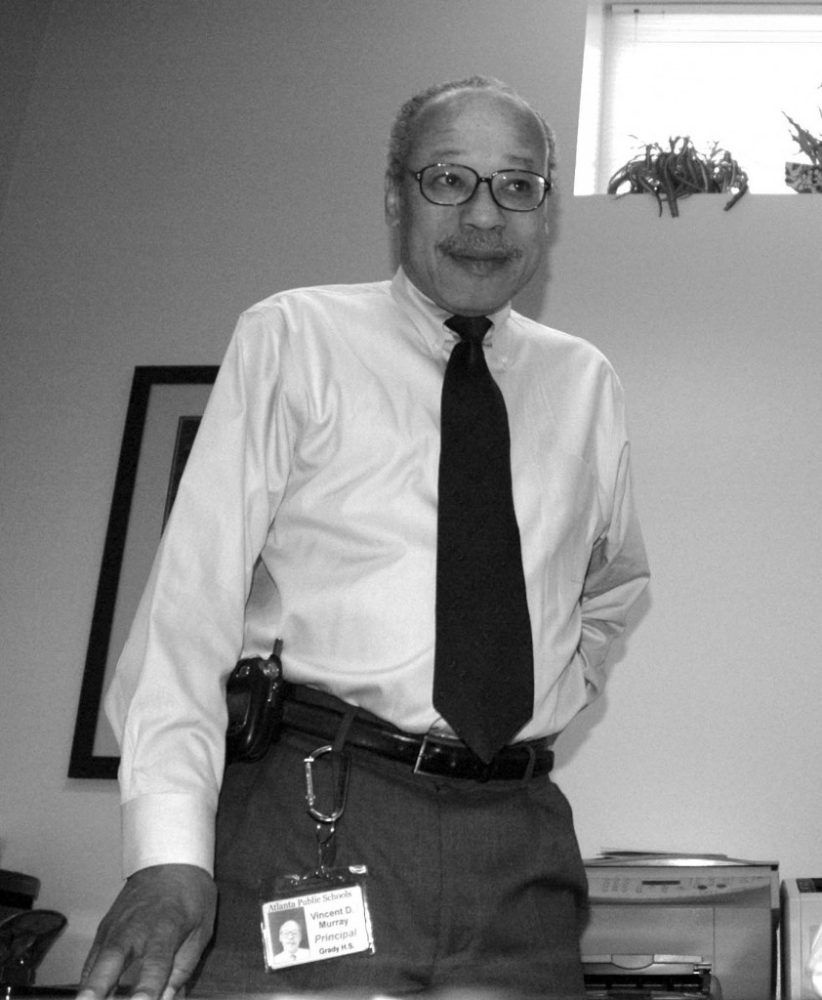
By Sarah Beth McKay
Known around campus as the administrator always willing to listen and ready to help, principal Dr. Vincent Murray has finally received the recognition he deserves. On Sept. 27 at a reception in New York City, The McGraw-Hill Companies presented him with the Howard W. McGraw, Jr. Prize in education for his exemplary leadership at Grady.
“I was surprised [when I received the award], more embarrassed than anything else,” Dr. Murray said. “You choose a profession because you want to see firsthand the outcomes that you know are possible. What I’ve done [at Grady] is just a part of that, not anything special.”
The McGraw-Hill Companies make up a worldwide corporation that provides financial, educational and business information through a myriad of publishing and media companies such as Standard and Poors, BusinessWeek and McGraw-Hill Education. The company established the Howard W. McGraw, Jr. Prize in Education in 1988 to mark its 100th anniversary and to honor their former CEO’s passion for education.
“It’s important for McGraw-Hill to recognize people who devote their whole lives to education and who have really made a difference in the field,” a McGraw-Hill representative said. “Recipients of the award in the past have greatly influenced educational reform and have affected education in a variety of different ways at elementary, middle school, high school, collegiate or even national levels.”
Every spring, McGraw-Hill receives hundreds of nominations from all over the nation, and a board of experienced educators and company officials examine each nominee. Three winners are chosen in the fall. Dr. Gene Bottoms, the 1995 former recipient of the award and the director of High Schools that Work, nominated Dr. Murray.
“The judges look for candidates who have had a lifetime commitment to helping students and have real results to show for it,” a McGraw-Hill representative said. “The [Howard W. McGraw, Jr.] Prize shines a spotlight on them, so others may learn from their examples.”
According to McGraw-Hill, Dr. Murray exceeds this criteria. In a press release describing the award recipient’s achievements, the company highlights his leadership of “the transformation of an inner-city public school into a higher-achieving institution.”
When Dr. Murray arrived at Grady 15 years ago, more than a third of all freshmen were held back and the school’s standardized test scores were well below the state average. Many students, especially those who were not part of the magnet program, were “still falling through the cracks,” according to Ms. Marian Kelly, chair of Grady’s English department.
Now, four out of five Grady graduates go directly to college. This year, 57 more seniors took the SAT than seven years ago.
“When I came to Grady, there was a carefree kind of atmosphere; students didn’t have a lot of restrictions,” Dr. Murray said. “There was a difference in how some classes appeared [to students]—there was not a lot of academic risk taking on the part of minority students. They took the core curriculum and that was it.”
Soon after his arrival, Dr. Murray set out to change the trend and get more students, especially minorities, involved in higher-level classes.
“After Dr. Murray observed for a bit, he worked with the staff to create a school reform plan,” Ms. Kelly said.

Dr. Murray accompanied almost 30 faculty members and a facilitator from High Schools that Work to Helen during the summer of 1997. The group decided to focus on helping freshmen by creating smaller homerooms and the ninth- grade transition program. The group also sought to expand the variety of opportunities presented to students when they came to Grady; the Health Academy was created as a result of the reform plan. Dr. Murray also focused his attention on encouraging more students to take higher-level classes.
“At the time, physics was taught in the 12th grade,” Dr. Murray said. “There was no representation of minority students. I found out that a lot of kids didn’t want to take challenging classes like physics because they might fail and not be able to graduate.”
In order to encourage students to take physics, Dr. Murray formed a partnership with Georgia Tech called Opportunity Sky Time, where students worked with flight simulators in their physics classes and received free flight time at the Fulton County Airport. He also worked with the school’s administrator to gradually move physics to a class taken at the ninth-grade level because he thinks “freshmen feel like they can do anything.”
Dr. Murray also oversaw the implementation of the Pacesetter program, which the College Board developed to prepare students to take Advanced Placement classes as early as the 10th grade.
“Education is accessible for everyone, but you have to have the right conditions to make kids successful,” he said. “They have a lot of their own self-doubts about what they are capable of, and you have to convince them they can step up and eliminate that fear. Early preparation [starting] in the ninth grade gives students the confidence that they could do well in honors and higher-level classes.”
Dr. Murray is able to identify areas in need of change and devise such effective remedies largely because he is very connected to all parts of the Grady community—teachers, staff, parents and especially students.
“Dr. Murray is the type of person who’ll listen,” Vice-Principal Naomi Grishman said. “He’s someone that the students know that they can express their concerns to. It’s a wonderful quality because a lot of principals don’t have that reputation.”
In addition to his talents for identifying and solving problems, administrators admire Dr. Murray’s multifaceted leadership skills.
“Dr. Murray is an effective principal because we have a school that serves a diverse group of students with a variety of needs, and through his dynamic leadership, the staff is able to meet those needs,” Ms. Grishman said. “He’s created a school culture where students can feel like they’re individuals, yet can come together to perform well.”
Although many attribute Grady’s tight community to Dr. Murray’s leadership, he credits it with the school’s amazing transformation in the last decade.
“The award really wasn’t for me; it was for the Grady community,” he said. “It’s been a very collaborative effort. It takes everyone—parents, teachers and students—to make the school a success. We all care about students’ education.”







